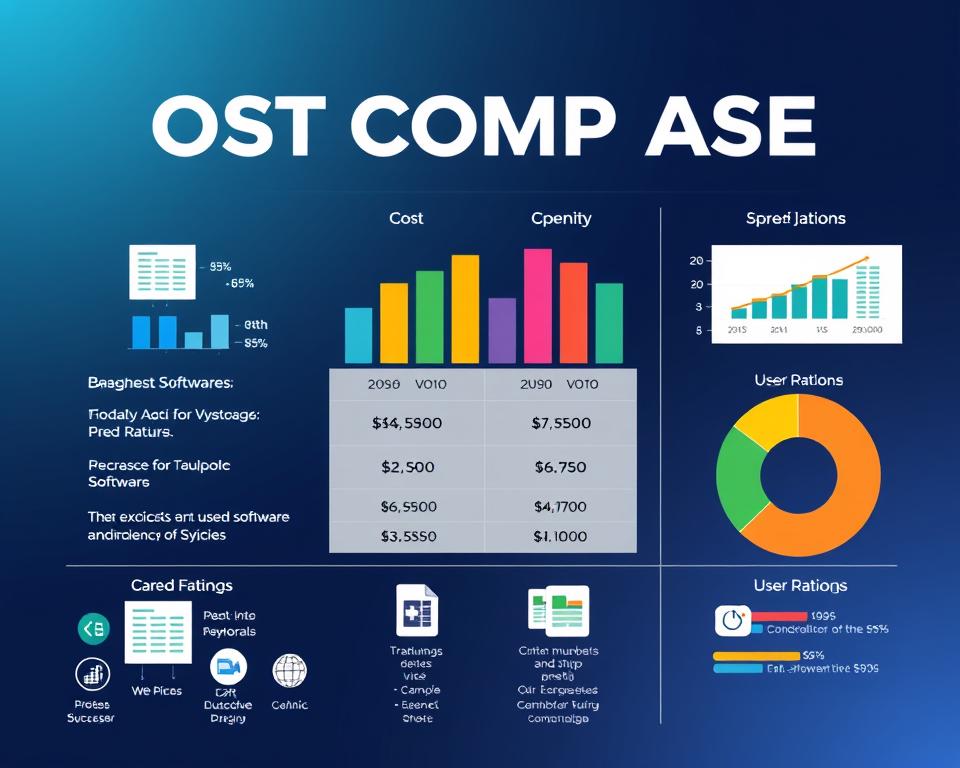I once found myself stuck with old spreadsheet software, feeling trapped. It was during a project with my team that I realized it was time for a change. I started looking for new spreadsheet software, and what I found was amazing.
The world of business tools has grown a lot since the old Excel days. Data management is now more complex, leading me to seek out more flexible and powerful tools. I discovered many cloud-based and hybrid solutions that offer new possibilities.
Exploring further, I saw how the right tool could change how I work with data and my team. Google Sheets stood out with its free version and affordable business plans starting at $6 per user per month1. Its collaboration features really caught my attention.
Zoho Sheet caught my eye because it’s free for up to 25 users2. This made me think about the savings for small businesses and startups. Smartsheet, on the other hand, offers team plans starting at $25 per month, with advanced features2.
ClickUp really impressed me with its free plan for unlimited tasks and members3. Their paid plans start at $7 per month per user, offering great value3. It has high ratings on G2 and Capterra, making me curious about its reliability and user satisfaction.
Let’s dive into these Excel alternatives together. We’ll look at their pros and cons and see how they can change your business’s data management. We’re on the hunt for a tool that meets and exceeds our needs in today’s digital world.
Why I Consider Spreadsheet Software Alternatives
I’ve used spreadsheets for years but now I’m looking at other options. As a business owner, I need software that grows with me. Excel is still popular, but other tools have features that make my work better4.
Understanding My Needs for Flexibility
My business needs tools that can handle different tasks. I’ve found some alternatives offer better cloud access and team work features. This makes it easier for me to work, whether I’m in the office or away4.
Exploring Different Features
Looking into other business tools, I’m impressed by what I see. Some have great project management, while others are top for showing data. These features let me customize my software to fit my needs5.
Avoiding Vendor Lock-in
Another reason I’m looking at alternatives is to avoid being stuck with one vendor. By trying different tools, I keep my data free and can change as my business does6.
Checking out spreadsheet alternatives has shown me new ways to work. These tools improve teamwork and data handling, making my business run smoother and faster.
Popular Spreadsheet Software Alternatives
I’ve looked into many Excel alternatives and business tools. I wanted to find the best spreadsheet software for my needs. Here’s a quick look at some popular choices I found.
Google Sheets: Collaboration at Its Best
Google Sheets is great for working together in real time. It can handle up to 10 million cells per spreadsheet, ideal for big projects. Plus, it works well with other Google Workspace apps, making my work easier7.
Microsoft Excel Online: Familiar Interface
Excel Online has a familiar look with teamwork features. It’s no wonder over 1.1 billion people use Excel worldwide, thanks to its strong features7. If you like the classic Excel but need it online, this is a top pick.
Zoho Sheet: A Budget-Friendly Option
Zoho Sheet is a free cloud-based spreadsheet tool that caught my eye8. It has over 350 functions, matching pricier options. It’s perfect for small businesses or startups looking to save money.
Airtable: Combining Spreadsheets and Databases
Airtable mixes spreadsheet and database features. It offers free basic use, with paid plans starting at $10 per user/month8. Its flexibility is great for handling complex data and relationships.
These spreadsheet software alternatives have different features for various business needs. From Google Sheets’ teamwork skills to Airtable’s database features, there’s something for everyone and every budget.
Key Features to Look for in Alternatives
When I look for spreadsheet alternatives, I focus on features that boost productivity. I also look for tools that make data management easier. Office software has evolved, offering more than just basic calculations.
Collaboration and Sharing Capabilities
Real-time collaboration is a big plus for team projects. I seek alternatives that let multiple users edit the same document at once. This can save a lot of time, as document work is a big part of lost productivity9.
Integration with Other Tools
It’s important for the software to integrate well with other tools. I look for spreadsheet software that works with my current apps. This integration helps me avoid wasting time searching for information or redoing work9.
Data Visualization Options
Good data visualization is essential for presenting insights. I prefer alternatives that offer many chart and graph options. Many Excel alternatives, like Google Sheets and Zoho Sheet, are more affordable or even free96.
When picking a spreadsheet alternative, I consider a few things. I look at how similar it is to Excel, how easy it is to use, and if it has add-ons. I also check if it works on different devices and operating systems6.
Comparing Costs: Are Alternatives Worth It?
I’ve been looking into the costs of different spreadsheet software and business tools. I want to find the best value for my office software needs. The prices vary a lot, from free to subscription-based models.
Free vs. Paid Options
Many spreadsheet alternatives have free versions with limited features. Excel, though popular, costs money. Some accounting software offers big discounts, like 70% off QuickBooks for 3 months10.
Free options like Google Sheets are good for small teams on a tight budget11.
Understanding Subscription Models
Paid options often have subscription models. Prices vary a lot based on features and how much you can scale. Excel might be cheaper upfront, but accounting software could offer more value with integrations and automation10.

Long-Term Value Considerations
When looking at long-term value, I think about more than just the price. Accounting software can save time and improve accuracy, which might make up for the higher initial cost10. On the other hand, a small mistake in Excel cost TransAlta $24 million in 2003, showing the risks of manual data entry10.
The best choice depends on what I need. Spreadsheets offer flexibility and customization. But, dedicated accounting software has special features and integrations that could be very useful for managing finances1110.
User Experience: What Matters Most to Me
Choosing spreadsheet software, I focus on user experience. A good interface is key to my productivity with business tools.
Interface Design and Usability
I seek intuitive layouts in spreadsheet software. Clean designs make navigating data tasks easier. Many alternatives to Excel let me customize colors and fonts6.
Learning Curve and Support Resources
Learning new spreadsheet software quickly is important to me. I look for platforms with great tutorials and documentation. Some Excel alternatives offer lots of support through online communities and forums6. This helps me learn new features fast and solve issues.
Customization Options
Flexibility in business tools is crucial for me. I like spreadsheet software that lets me customize views and functions. Options like grid, calendar, and Gantt views improve my project management. Excel alternatives often have these diverse viewing options12.
I aim for a balance between functionality and simplicity. While advanced features are great, I don’t want to feel overwhelmed. The best spreadsheet software for me offers powerful tools with an easy interface. This ensures I work efficiently without a steep learning curve.
Security Considerations in Using Alternatives
When I look into spreadsheet alternatives, I focus on their security features. Traditional spreadsheets often don’t protect sensitive info well. This makes businesses at risk of data breaches13.
Data Privacy and Compliance
Many office software options don’t have strong access controls. This can lead to data sharing and leaks. It’s especially risky when dealing with personal or financial data13. So, I look for tools with Single Sign-On and strict access controls to boost security.
Backup and Recovery Features
Data loss is a big worry with spreadsheets. Files on personal devices without good security can be accessed without permission13. That’s why I choose alternatives with automatic backup and recovery. This keeps my work safe.
User Permissions and Access Control
Spreadsheets often don’t show who changed data or how14. I look for tools with detailed user permissions and access control. This keeps my data safe and stops unauthorized changes.
By focusing on these security points, I make sure my spreadsheet alternative meets my needs. It also keeps my business info safe and sound.
Cloud-Based vs. Desktop Software: My Preferences
I’ve looked at both cloud-based and desktop spreadsheet software for my business. Each has its own benefits for managing data and staying productive.
The Benefits of Cloud Accessibility
Cloud options like Google Sheets let many people work together at the same time. This boosts teamwork and productivity in my business15. Plus, I can get to my spreadsheets from anywhere, making it perfect for working on the move.
Offline Capabilities: A Must-Have?
Cloud access is great, but offline work is key for me. Desktop software like Microsoft Excel lets me work without the internet16. This is super useful when I’m traveling or in places with no internet.
Syncing Across Devices
Being able to sync across devices is a big plus for me. It means I always have the latest data, no matter what device I’m using. This makes my work smoother and saves me time15.
When picking between cloud-based and desktop software, I think about what I need. Cloud tools are great for teamwork, but desktop versions like Excel are better for detailed projects15. The best choice really depends on my work and how much I need to collaborate.
Integrating with Existing Tools
Integrating spreadsheet alternatives with my current office software and business tools is key for efficient data management. I always check if the new options work well with my systems.
Popular Integrations to Consider
Many spreadsheet alternatives work well with popular business tools. Google Sheets, for example, connects easily with other Google Workspace apps. It also supports many file formats like .xlsx and .csv17. Smartsheet, though more expensive at $168 a year, works well with CRM and project management tools18.

Streamlining Workflow Through Integration
Good integrations can make my workflow much smoother. Airtable, for example, helps build databases and supports file formats like .csv and .xlsx17. It also has customizable views and templates for different industries18. These features help me manage data better across platforms.
Evaluating Compatibility with Current Systems
When checking compatibility, I look at file format support and functionality. WPS Office Spreadsheets supports many formats, including .xlsx and .csv17. It costs from $44.99 and can handle over 1 million cells per sheet, perfect for complex tasks18. I make sure any new tool works well with my current office software.
Mobile Accessibility: Important for On-the-Go
Mobile accessibility is key for managing spreadsheets and business tools on the move. Being able to access and edit data on my phone or tablet has changed my workflow.
Mobile Apps vs. Mobile-Friendly Websites
I prefer mobile apps over websites for spreadsheet software. Apps give a smoother experience and better offline use. For example, Google Sheets lets me edit offline, syncing changes when I’m online19.
Key Features in Mobile Versions
I look for certain features in mobile spreadsheet software. I need easy data entry, basic editing tools, and real-time syncing. MobiSheets, for instance, is popular for its updates and reliability19.
Synchronization Between Devices
Seamless syncing between my desktop and mobile is crucial. Cloud-based solutions like Zoho Sheet excel in this. They let me automate tasks and create workflows that sync across devices, making my work smoother19.
Choosing spreadsheet software and business tools with mobile accessibility in mind keeps me productive. I can manage my data well, wherever I am.
Community and Support: Why It Matters to Me
When picking spreadsheet software or business tools, I look for strong user communities and support. These are key to a great experience with office software.
Forums and Online Communities
Online communities are super helpful for solving problems and learning new things. For example, LibreOffice Calc has a big community. They help each other out on forums20. This makes it easy to find solutions and learn from others.
Availability of Tutorials and Documentation
Good learning resources are essential for getting the hang of spreadsheet software. Apple Numbers stands out with its useful templates for personal finance and business20. These templates act as hands-on tutorials, showing me how to use the software in real life.
Customer Support Options
Having reliable customer support is a big plus when using complex business tools. Some alternatives to Microsoft Excel, like Hurree, offer great support through chat and email21. This means I can get help fast, reducing downtime and stress.
The quality of community and support really shapes my choice of office software. It’s not just about the features. It’s about the whole ecosystem that supports me in my work.
Advanced Features That Enhance My Experience
When picking spreadsheet software, I look for more than basic tools. I seek features that boost my productivity and make my work flow better.
Data Analysis Tools and Functions
Good data analysis tools are key for smart decisions. Microsoft Excel is great for big spreadsheets1. But, Google Sheets shines with its team work and version history, missing in Excel1. These are great for team work and keeping track of changes.
Macros and Automation
Automation saves time and cuts down on mistakes in routine tasks. Excel alternatives often have strong macro tools. Smartsheet, starting at $9 a month, has lots of project templates to customize1. This has made my work much more efficient.
Add-ons and Extensions
Being able to add more features is a big plus. Airtable stands out with its wide use and flexibility, starting at $20 a month1. Quip’s ability to embed spreadsheets in documents has changed team collaboration1. These features have greatly improved my experience with spreadsheet software, making it more efficient and team-friendly.
Making the Switch: Steps to Transition Smoothly
I’m excited to switch to new spreadsheet software, but I know it needs careful planning. First, I’ll check how I use my current spreadsheets. This is key because over 50% of businesses face challenges with real-time collaboration and error reduction in traditional spreadsheets22.
Assessing Current Spreadsheet Use
I’ll look at what features are most important to me. Excel has been a top choice for data manipulation for over 30 years. Yet, it struggles with large datasets and complex calculations2324. I’m thinking about Google Sheets for cloud-based collaboration or Airtable for its project management features23.
Training and Onboarding My Team
Then, I’ll create a training plan for my team. I’m eyeing Smartsheet, which offers a 30-day free trial. This will help us see if it fits our project management and task tracking needs2324. I’m also looking at no-code platforms like Airtable, which lets us build custom databases without coding skills22.
Migrating Data Safely and Efficiently
Lastly, I’ll focus on moving our data safely and efficiently. I’m leaning towards cloud-based tools like Google Sheets or Zoho Sheet. They allow multiple users to edit documents at the same time and offer secure sharing22. Zoho Sheet supports nearly every common file format, including Excel, making our transition easier24. This will help keep our data safe during the move and improve our data management.
FAQ
Why should I consider alternatives to Microsoft Excel?
What are some popular spreadsheet software alternatives?
What key features should I look for in spreadsheet alternatives?
How do costs compare between Excel and its alternatives?
What should I consider regarding user experience?
How important are security features in spreadsheet alternatives?
What are the benefits of cloud-based spreadsheet solutions?
How important are integration capabilities with other business tools?
What should I look for in terms of mobile accessibility?
How important is community support and resources?
What advanced features should I consider in spreadsheet alternatives?
How can I smoothly transition to a new spreadsheet software?
Source Links
- https://zapier.com/blog/best-spreadsheet-excel-alternative/ – The best spreadsheet software and Excel alternatives in 2025
- https://hive.com/blog/excel-alternatives/ – Top 17 Excel Alternatives To Replace Spreadsheets in 2024
- https://clickup.com/blog/excel-alternatives/ – 11 Excel Alternatives for Spreadsheets in 2024 (Features & Pricing) | ClickUp
- https://www.business.com/articles/best-spreadsheet-software/ – What Is the Best Spreadsheet Software?
- https://lucid.co/blog/spreadsheet-alternatives – Collaboration Reinvention: Spreadsheet Struggles
- https://nimbusweb.me/blog/top-microsoft-excel-alternatives/ – 8 Excel Alternatives: Their Features, Pros, & Cons
- https://stackby.com/blog/excel-alternatives/ – Top 12 Excel Alternatives & Competitors (2024) | Stackby Blog
- https://tadabase.io/blog/best-spreadsheet-alternatives – 10 Best Spreadsheet Alternatives in 2024 | Tadabase
- https://www.teamwork.com/blog/excel-alternative/ – 10 Excel alternatives for improving your data organization
- https://quickbooks.intuit.com/r/accounting/excel-vs-accounting-software/ – Excel vs. accounting software: Key differences | QuickBooks
- https://www.linkedin.com/pulse/project-management-software-vs-spreadsheet-which – Project Management Software vs. Spreadsheet – which is best?
- https://www.method.me/blog/what-is-better-than-excel-for-large-data/ – What is better than Excel for large data — best Excel alternatives — Method
- https://rowzero.io/blog/spreadsheet-security-risk – 10 ways spreadsheets violate data governance and pose a security risk
- https://www.oracle.com/business-analytics/spreadsheet-risks/ – 10 Common Spreadsheet Risks and Solutions for Businesses
- https://seorocket.ai/blog/choosing-the-best-spreadsheet-software-for-your-needs/ – Choosing the Best Spreadsheet Software for Your Needs
- https://www.semrush.com/blog/spreadsheet-software/ – The 10 Best Spreadsheet Software of 2024
- https://www.techrepublic.com/article/free-alternatives-to-microsoft-excel/ – The 10 Best Free Microsoft Excel Alternatives for 2024
- https://dryfta.com/top-10-alternatives-to-microsoft-excel/ – 10 best alternatives to MS Excel (2023} | Dryfta
- https://mobisystems.com/en-us/blog/tutorials/what-to-look-for-in-free-spreadsheet-software – What To Look For In Free Spreadsheet Software | MobiSystems
- https://www.xda-developers.com/tired-of-paying-for-microsoft-excel-here-are-the-5-best-free-alternatives/ – Tired of paying for Microsoft Excel? Here are the 5 best free alternatives
- https://blog.hurree.co/6-alternatives-to-excel-for-marketers – 6 Alternatives to Excel for Marketers
- https://teamdeck.io/resources/alternatives-to-spreadsheets/ – Alternatives to Spreadsheets
- https://blog.vault-erp.com/post/2023/12/06/what-s-better-than-excel-exploring-spreadsheet-software-and-excel-alternatives – What's better than Excel? Exploring spreadsheet software and Excel alternatives
- https://www.kohezion.com/blog/excel-alternatives – Excel Alternatives 2024: Empower Spreadsheets with 10 Best Picks
